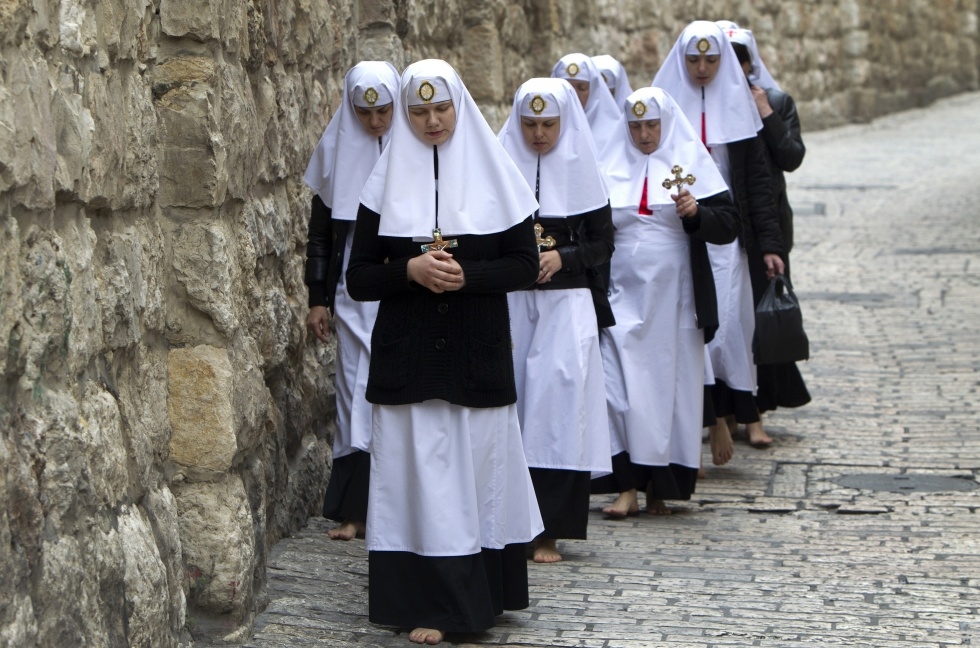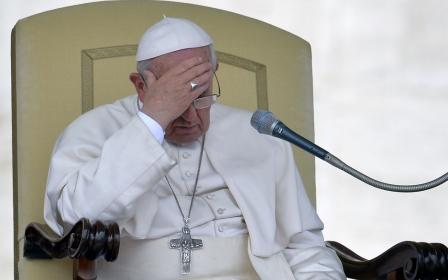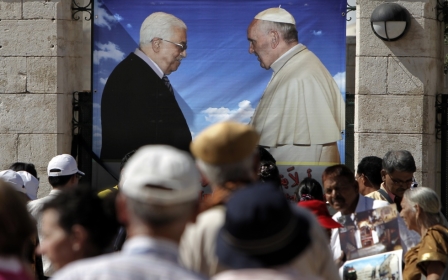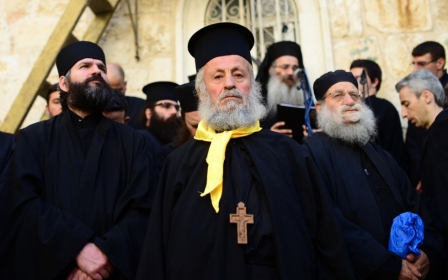Israel woos its Christian citizens in bid to split Palestinians

By Philippe Agret
JERUSALEM - In a region marked by sectarian division, Israel is trying to bring its Christian Arab population on side in a move aimed at splitting them from their Muslim compatriots, experts say.
This Israeli charm offensive has recently led to the army calling for the first time on Arab Christians to sign up for military service, and in a newly-passed law which formalises a distinction between Christian Arabs and Muslims.
"We and the Christians have a lot in common," MP Yariv Levin said at the time.
"They're our natural allies, a counterweight to the Muslims who want to destroy the country from within," said Levin, a member of Prime Minister Benjamin Netanyahu's right-wing Likud party which sponsored the bill.
It is a discourse in keeping with the neo-conservative world view of a "clash of civilisations" between the Judeo-Christian West and Islam which has been embraced by Netanyahu - a close ally of both the US Republican right and the Zionist evangelicals.
It is not the first time Israel has tried to align itself with its "natural allies" in the predominantly Muslim Middle East. It did so in Lebanon in the 1980s by backing the Christian Phalangist militia and its ally the South Lebanon Army against their Muslim opponents.
"There is indeed a significant decline in the condition of the Christians in the Middle East," said professor Gabriel Ben-Dor, head of national security studies at Haifa University.
"In Israel, this is perceived as the moment to improve the standing of the Christian minority in Israel," he explained, saying it would also "significantly improve" Israel's international standing.
But ahead of a key visit to the Holy Land by Pope Francis which begins on Saturday, this apparent strategy of divide and rule has Israel's Arab community worried.
'They are Palestinians'
Israel's Arab population - descendents of some 160,000 Palestinians who remained after the Jewish state was established in 1948 - today numbers 1.4 million, 130,000 of whom are Christians.
Military service is not compulsory for Israel's Arabs, except for the tiny Druze community, and only around 100 Christians volunteer for service each year, army figures show.
But last month, Israel said it would start sending enlistment papers to all Christian Arabs of military service age, angering Arab MPs who accused the government of seeking to divide Christians from Muslims.
The reaction of the Christian Churches was not slow in coming.
In Nazareth, the largest Arab city in Israel, the Greek Orthodox Church sacked one of its priests after he publicly encouraged young Arab Christians to join the army to understand "the importance of serving and getting involved in the country in which they live and which protects them."
The Latin Patriarchate of Jerusalem, which represents the Roman Catholic Church, protested against the army's decision to seek a tenfold increase in the number of Christian recruits annually.
"The issue is that these Christians are Palestinian," said Michel Sabbah, patriarch between 1988-2008 and the first Palestinian to hold the post for centuries.
"If you accept yourself as Palestinian, you must be logical with yourself -- you don't go into an army which maintains occupation on Palestinians, or kills Palestinians.
"You have to be a good citizen inside the state of Israel, but being a good citizen does not imply that you are ordered to kill your brothers who are Palestinians," he said.
Playing the sectarian card
Opponents accuse nationalist right-wing elements within Netanyahu's coalition of playing the "sectarianism" card and seeking to create a divide between Christians and Muslims.
"I don't think that Israel is serious about integrating Arab Christians in Israeli society on the basis of full, equal-rights citizens. This is a clear attempt to split the Arab-Palestinian minority in Israel," said political analyst Wadie Abu Nasser.
"If Israel is serious, why does discrimination continue vis-a-vis the Druze who serve in the army? And why it doesn't allow Palestinian refugees of Christian background to come back?" said Abu Nasser, a former spokesman for the Latin Patriarchate.
If the strategy succeeds, it will only be "in a very limited way," he said.
"Israel's strategic mistake is not to reply to regional instability in positive ways.
"Making peace with the Palestinians and offering full equality to all of its citizens are the best guarantees for Israel's future in the region."
Middle East Eye propose une couverture et une analyse indépendantes et incomparables du Moyen-Orient, de l’Afrique du Nord et d’autres régions du monde. Pour en savoir plus sur la reprise de ce contenu et les frais qui s’appliquent, veuillez remplir ce formulaire [en anglais]. Pour en savoir plus sur MEE, cliquez ici [en anglais].




